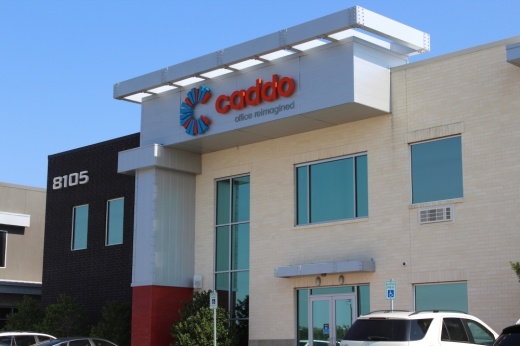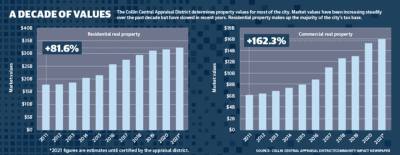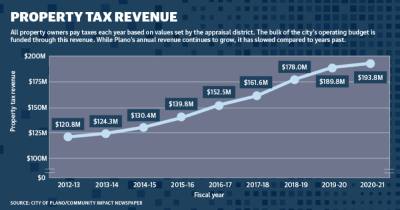From 2016 to 2017, the commercial market in Plano grew by $2 billion, one of its largest yearly increases. The market jumped again by $2.4 billion from 2019 to 2020, according to the CCAD.
For 2021, early estimates project a $600 million annual growth. While Plano’s commercial property values have nearly tripled in the past decade, the COVID-19 pandemic may have slowed that progress, city officials said.
“The pandemic has had an impact on just about every phase of life, including commercial property values,” CCAD Chief Appraiser Bo Daffin said. “It’s been a big task on all sides of this to try to deal with the impacts of [COVID-19] and try to make appraisal determinations out of it.”
Daffin said the appraisal district considers factors such as the ability to produce income and the frequency of rent collection when estimating a commercial property’s appraised value. The longer a building is partially or fully vacant, the more its value is affected.
Despite these challenges, some experts maintain a positive outlook for the future of the office market. April survey results released by CBRE, a commercial real estate services firm, predicts office occupancy across the U.S. will gradually begin to increase this summer before accelerating in the third quarter of this year.
Forming a plan
Mayor John Muns said the pandemic forced many Plano employees to work from home, which took them out of their office spaces. Many have yet to return to in-person work, a trend that could continue.
That change has left many of the corporate offices throughout the city unused, leading some city officials to contemplate how best to fill those spaces moving forward.
“What we think we knew about the business environment ... has changed so much,” Muns said. “We have to be flexible in understanding what the demand is going to be and what [demand] isn’t going to be there. That’s a real concern to the city.”
There is nearly 43 million square feet of office space in Plano, according to an analysis by international commercial property company CoStar Group. Nearly 10 million square feet of that total space was vacant as of June, the report said.
Muns believes the city should take a more measured approach to commercial developments moving forward.
“Everyone has the best intentions for the city,” Muns said. “But to say that a 10-story office building is going to [be built], that may not happen within the next five to 10 years. Things do change.”
The sublease market could be an asset moving forward, Muns said, as some of the bigger companies in Plano could rent out extra or unused office space to smaller companies.
He pointed out remote work can make it difficult to attract new companies to the city.
“If somebody lives on the West Coast or the East Coast, they don’t have to bring [employees] here. I’m hopeful they will,” he said. “We want to make sure we’re providing the amenities and opportunities for corporate communities to come here ... and to remain here.”
A leg up
Daffin said the commercial market is currently more favorable for buyers, unlike the housing market, which is more advantageous for sellers.
“If I’m negotiating as the buyer, I would use the lower rents and higher vacancies that occurred during the pandemic [as leverage],” he said.
Sellers would likely point out the commercial market is beginning to recover and note the property’s value before the pandemic, Daffin said.
It is not an appraiser’s job to predict where the market is headed, Daffin said. But he does believe Plano and other communities in North Texas are in a better position than most due to the strong job market and growing population.
“Plano has held up well from what I can tell,” he said. “Not huge losses in value, and I think the corporate properties have [also] held up.”
One commercial business that thrived during the pandemic is fitness company Peloton. The business announced plans in December to expand its Plano offices in Legacy Central by nearly 100,000 square feet. The company plans to hire more than 1,500 employees for the expanded space and estimates the new offices to be completed this summer.
“Peloton has grown tremendously in the last two years, and we’re thrilled this larger footprint will allow us to bring key leadership and managerial roles along with additional entry-level positions to the area,” said Mariana Garavaglia, Peloton’s chief business operations officer, in a 2020 city report.
Looking ahead
As some companies return to the office, many still wonder what the future holds for corporate working environments.
Tim Slaughter is a managing partner and founder of Caddo Holdings, a commercial real estate firm that specializes in buying, leasing and selling office space. The firm works in many Texas markets.
Slaughter has offices in Plano and said occupancy rates for the properties his company owns dropped by nearly 15% last year. After the Texas ice storm in February, Slaughter said, he noticed a significant uptick in business.
“That was kind of the perfect nexus of people are vaccinated, and [now] they want to get the heck out of the house,” he said.
Slaughter said people are still trying to figure out how the debate over in-office versus remote working will evolve. He said some large companies last year declared “we’re never going to work from the office again” but are now backing off those statements.
“People have seen that you can be productive in a remote work environment,” he said. “But then the downside is that you don’t get any separation from work and home; you have that distraction. All the pandemic did was accelerate some trends that were already happening. It just went a lot faster, you know, for better or worse.”







